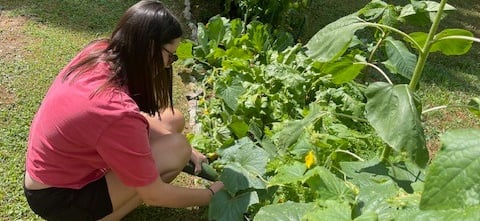The Importance of Organic Gardening
Learn about the significance of organic gardening and how it contributes to a sustainable and healthy lifestyle.
Nikki Carr
1/1/20252 min read
In this blog post, we will delve into the world of organic gardening and its numerous benefits.
In an age where our connection to the earth is more important than ever, organic gardening stands as a beacon of sustainability and health. As we delve into the world of organic gardening, let’s uncover the many benefits it offers.
1. Healthier, Nutrient-Rich Produce: One of the most significant advantages of organic gardening is the production of nutrient-rich, chemical-free fruits and vegetables. By avoiding synthetic pesticides and fertilizers, organic gardens yield produce that is not only safer to consume but also has essential vitamins, minerals, and antioxidants.
2. Supporting Pollinators and Wildlife: Organic gardens serve as havens for pollinators such as bees, butterflies, and birds. By cultivating a diverse array of plants and minimizing the use of pesticides, organic gardeners create thriving ecosystems that support essential pollination services and provide habitat for a variety of wildlife.
3. Promoting Food Security: In a world marked by food insecurity and unequal access to nutritious foods, organic gardening offers a path towards greater food sovereignty. By empowering individuals and communities to grow their own food, organic gardening helps ensure access to fresh, healthy produce regardless of socio-economic status.
4. Community Building: Organic gardening fosters a sense of community and connection to the land. Whether through shared garden plots, farmers’ markets, or educational workshops, organic gardening brings people together to celebrate the beauty and bounty of nature while promoting sustainable living practices.
5. Environmental Conservation: Organic gardening practices prioritize the health of the soil, water, and surrounding ecosystems. By avoiding harmful chemicals and embracing natural fertilizers and pest control methods, organic gardeners play a crucial role in preserving biodiversity, reducing pollution, and mitigating climate change.
6. Reducing Carbon Footprint: By growing food locally and organically, gardeners can significantly reduce their carbon footprint. Organic gardening minimizes reliance on fossil fuels for the production and transportation of synthetic inputs, while also sequestering carbon in the soil through practices like composting and crop rotation.
7. Preserving Traditional Wisdom: Organic gardening honors age-old farming practices and traditional knowledge passed down through generations. By embracing natural growing methods and heirloom varieties, organic gardeners contribute to the preservation of agricultural diversity and cultural heritage.
Organic gardening is not just a means of growing food; it is a way of life rooted in respect for the earth, a commitment to sustainability, and a deep appreciation for the interconnectedness of all living things. As we tend to our gardens with care and reverence, let us cultivate not only healthy plants but also a brighter, greener future for generations to come.


